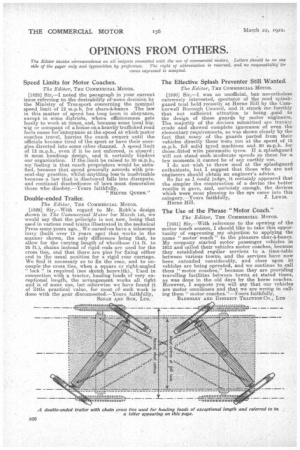OPINIONS FROM OTHERS.
Page 30

If you've noticed an error in this article please click here to report it so we can fix it.
The Editor invites cOrrespondence on all subjects connected with the use of commercial motors. Letters should be on OM side of the paper only and typewritten by preference. The right of abbreviation is reserved. and no responsibilitil for views expressed is accepted.
Speed Limits for Motor Coaches.
The Editor, THE COMMERCIAL MOTOR.
[1828] Sir,—I noted the paragraph in your current issue referring to the desirability (*some decision by the Ministry of Transport concerning the nominal speed limit of 12 m.p.h. for chars-h-bancs The law in this matter of speed has long been in abeyance, except in some districts, where officiousness gets busily to work at times,,and, because some local bigwig or occupant of &house onaheavilytraffickedroad feels cause for-annoyance at the speed at which'motor coaches travel, harries the coach owner's until the officials become tired of the sport or have their energies directed into some other channel. A speed limit of 12 m.p.h. even if it be not enforced,. is absurd ; it must handicap design, and it certainly hinders our organization. If thedimit be raised to 20 m.p.h., my' feeling is that coach proprietors would be satisfied, because that speed generally accords with present-day practice, wililst.anything Iesssis inadvisable because a law that is disobeyed falls into disrepute, and continual disobedience of laws must demoralize those who disobey.—Yours faithfully,
"SILVER QUEEN."
Double-ended Trailer.
The Editor, THE COMMERCIAL MOTOR.
[1829] Sir,—With regard to Mr. Robb's design shown in The Commercial 'Motor for March 1st, we would any that the principle is not new, being that used in various read trains illustrated in ihe. technical Press some years ago. , We ourselves have a telescope lorry (built over 15 years ago) that works in the manner shown, the only difference being that, to allow for the varying length of wheelbase (14 ft. to 25 ft.), chains instead of rigid rods are used for the cross ties and that there are pins -for fixing either end in the usual pogitien for a rigid rear carriage. We find itnecessary so to fix the rear, and to uncouple the cross ties, when a square GT right-angled " lock is required (see sketch herewith).. Used in connection with a tractor, hauling loads of very exceptional length,the arrangement works all. right and is of some use, but otherwise we have found it of little practical value, for most of such work is done with the gear disconneeted.--Yours SLOAN AND SON, LTD.
The Effective Splash Preventer Still Wanted.
The Editor, THE COMmERCIAL MOTOR.
[1830] Sir,—I was an unofficial, but nevertheless extremely interested, spectator of the mud splashguard trial held recently at Herne Hill by the Camberwell Borough Council, and it struck me forcib1y that not sufficient attention is being ,paid to the design of these guards by motor engineers. The majority of the devices submitted are Iraukty crude and showed complete ignorance of even the elementary requirements, as was shown clearly by the fact that many of the guards parted from their vehicles directly these were run at the speed of 15 m.p.h. for solid tyred machines and 20 m.p.h. for those_fitted with pneumatic tyres. If a splashguard will not stand such moderate speeds as these for a few moments it cannot be of any earthly use.
I do not-wish to throw mud at the splashguard enthusiasts, but I suggest that those who are not engineers should obtain an engineer's advice. So far as I Could judge, it certainly appeared that the simpler the construction of a device the better results it gave, and, curiously enough, the devices which were most pleasing to the eye came into this
category.—Yours faithfully, J. LEWIS. Herne Hill.
The Use of the Phrase "Motor Coach."
The Editor, THE COMMERCIAL MOTOR.
[1831] Sir,—With reference to. the opening of the motor coach season, I should like to take this opportunity of expressing my objection to applying the name " motor-coach " to the pleasure char-lisbancs. My company started motor passenger vehicles in 1913 and called their vehicles motor coaches. because they established regular services to a. time-table between various towns and the services have now been extended considerably, and close upon 50 vehicles are being operated, and 'we continue to call them ," motor coaches," because they are providing travelling facilities between towns at stated times, as was done in the old days by the horse coaches. However, I suppose you will say that our vehicles are motor omnibuses and that we are wrong in calling them "motor coaches."—Yours faithfully,
BARNSLEY AND DISTRICT TRACTION CO., LTD
































